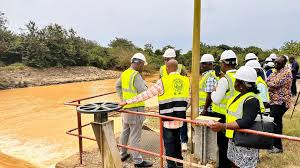The Managing Director of Ghana Water Limited (GWL), Mr. Adam Mutawakilu, has warned that the Kwanyaku Headworks in the Central Region may be forced to shut down if urgent action is not taken to tackle high turbidity levels in its raw water source.
The Kwanyaku Headworks is one of the most important treatment plants in Ghana, serving more than 30 districts including Winneba, Swedru, and Kasoa. However, pollution in the Ayensu River, which feeds the plant, has pushed turbidity levels far beyond its design capacity.
During a working visit to the facility, Mr. Mutawakilu disclosed that turbidity readings soared to 32,000 Nephelometric Turbidity Units (NTU) last week. Although levels had dropped to 11,000 NTU at the time of his visit, the figure was still extremely high compared to the plant’s maximum design capacity of 2,500 NTU.
“This means the water quality we are receiving is more than four times above capacity. It is placing a huge strain on our equipment and the production process. Engineers and staff are doing their best, but if this situation continues, we may be forced to shut down the plant. That will bring heavy costs to the company and serious hardship to consumers,” the Managing Director explained.
He said preliminary checks suggested that the contamination could be linked to illegal mining and other environmentally damaging activities along the river. To confirm this, he has directed the Central Regional Chief Manager and the Kwanyaku team to work with the Accra head office to deploy drones to trace the exact source of the pollution.
“We cannot just report that turbidity is high without evidence of where it is coming from. With drone surveillance, we will be able to identify whether illegal mining or farming activities are to blame. Once identified, we can then engage the right authorities for swift corrective action,” he said.
Mr. Mutawakilu stressed that shutting down the plant would remain a last resort. He assured residents that the company would continue to produce and distribute water, even if intermittently, to avoid complete service disruption.
Beyond Kwanyaku, the GWL boss also raised concerns about the state of infrastructure at the Weija and Kpong treatment plants, which supply Accra and surrounding areas. According to him, some of the equipment at Weija dates back to 1965, while sections of pipelines are still made of asbestos, a material considered unsafe for water transmission.
“In this modern age, asbestos should not be used to supply water. Yet we still have them in our system. This leads to frequent leakages and breakdowns. Recently, a major pipeline at Weija burst, and we had to quickly mobilise resources to repair it. At the same time, cables at the Dodowa Booster Station also developed faults and needed replacement,” he said.
Despite the challenges, he assured customers that both Weija and Kpong plants were functioning. He, however, admitted that water supply in Accra was still facing a wide gap. Current daily demand stands at about 220 million gallons, but the company can only produce 140 million gallons, leaving a shortfall of nearly 80 million gallons every day.
To address the crisis, Ghana Water Limited has since August stopped the use of water tankers for commercial purposes, in a bid to reduce non-revenue water which accounts for over 50 percent of the company’s supply losses.
“When we connect a customer to our pipeline, it is our responsibility to make sure that person gets water. That is our core mandate. Even as we work to expand, those already connected must remain our priority,” he said.
Mr. Mutawakilu further disclosed that the company was working closely with the government to secure investment for new treatment plants and to replace aging pipelines. He said the reforms would help reduce leakages, improve efficiency, and narrow the gap between water supply and demand.
The warning from GWL comes at a time when many Ghanaians are already grappling with water shortages. Residents in areas like Kasoa and Winneba have raised concerns about irregular supply, while urban centres such as Accra continue to face demand pressures. The situation has highlighted the urgent need for investment in Ghana’s water infrastructure and stronger environmental protection measures to safeguard water sources.
